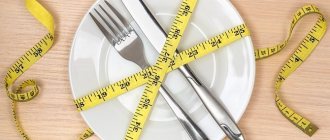Many of us have heard or read about the benefits of fasting. Famous people, including recognized yoga teachers and competent nutritionists, spoke and wrote about the need to give up food.
Medical fasting came to our country relatively recently; In one form or another, fasting was talked about during the Soviet era, but the official position of medicine and the authorities was unequivocal: vegetarianism, like fasting, was recognized as the “corruptive influence of the West,” and the softest thing that awaited the supporters of such theories were sidelong glances colleagues and relatives.
In the mid-80s, Porfiry Ivanov called on supporters of his system to give up food once a week for a day in order to cleanse the body, but most people were hostile to these ideas as a hardening technique. The situation changed dramatically in the early 90s, when many people discovered different diets and nutrition systems; Among them, the works on food compatibility by Herbert Shelton were popular, who, among other things, assured his supporters of the benefits of therapeutic fasting.
Despite the abundance of information, many gaps remain in the issues of fasting and the correct way out of it. If you are well versed in this topic, then it is unlikely that you will learn much new from this article, but it will not hurt to brush up on your knowledge. If you are just planning to start fasting, then it will be important to once again remember its benefits for maintaining motivation, and also understand how to properly exit it so as not to harm your body.
Benefits of fasting
When it comes to fasting, motivation plays an important role. A person needs to understand what he is doing and why. Therefore, before we talk about how to start fasting and complete it correctly, we will emphasize the benefits that the body can receive from this process.
- Development of discipline. During fasting, you learn to control your feelings and manage your desires. This is certainly an important quality that will help you in various situations, such as when switching to a healthy, balanced diet. Following any diet will be much easier if you have experience of fasting.
- Losing weight. This is perhaps the most obvious benefit of fasting. When we refuse to eat, our body starts the fat burning process. During a fast, you will burn fat mass without losing muscle mass, which is especially important for athletes.
- Prevention of diseases. Fasting is the prevention of diseases, including non-infectious gastritis, problems with the liver and gastrointestinal tract, pancreatitis.
- Strengthening the immune system. You will become less susceptible to infectious diseases, chronic fatigue, a common cause of which is a sludge buildup in the body, will disappear.
- Cleaning from slags. Over the years, the body becomes clogged, slagging leads to malfunctions of the internal organs, but the combination of fasting and vegetarianism allows you to cleanse the body faster.
Mahatma Gandhi said that fasting is necessary because it opens one's view of the spiritual world. In various religious teachings we can find information that individuals who realized themselves in the spiritual field voluntarily gave up food.
Buddha Gautama did not eat for 40 days - after this period the path to liberation was open to him. Supporters of Jainism are well aware that Mahavira adhered to a certain diet, where the emphasis is on complete abstinence from food. For spiritual transformation, religious doctrines advise their adherents to periodically abstain from food.
It becomes obvious that fasting is not only a way to restore lost health or figure, but also a method of spiritual transformation.
Other Benefits of Water Fasting
It may be hard to believe, but yes, water fasting can improve your overall health. Here is a list of benefits.
- Helps you lose weight.
- Water fasting has proven beneficial for those suffering from hypertension.
- This will help reset your body.
- As water washes away all toxins, your skin becomes smoother.
- Water fasting can also help you sleep better. When your body is deprived of any nutrition, it will be impossible to stay awake for long hours. Sleep helps us have better memory and less stress and anxiety.
- Your digestion improves significantly.
- Excess unwanted toxins in your colon are cleansed.
- Water fasting can eliminate or reduce muscle pain, joint pain and headaches.
- Food and drink can cause a lot of damage to your teeth and gums. Water fasting can help you get healthier gums and teeth.
- Water fasting can also improve blood circulation.
- You can get a healthier cardiovascular system.
- It helps build lean muscle.
- Your brain becomes more active and your concentration improves.
- This fasting can help you improve many chronic diseases.
- May help fight Parkinsons and Alzheimer's disease.
- It improves insulin sensitivity.
- Increases self-esteem. You are losing weight and your determination to complete it quickly gives you the satisfaction of completing a challenging task.
What are the contraindications to fasting?
Contraindications to fasting are divided into two groups: absolute and relative. The difference is that if you have relative contraindications, then you can start fasting after consultation with a specialist (doctor, nutritionist).
Absolute contraindications put a complete ban on this practice. To avoid harm, always remember that dubious nutrition gurus from the Internet are not the ultimate truth; sometimes they may not only have no medical education, but no education at all. Promising to cure any disease, they are capable of driving their supporters to death.
Therefore, even if you do not have the contraindications described below, consult with a specialized specialist before starting fasting, since some diseases can occur in a latent form (for example, heart disease).
Absolute contraindications include:
- malignant blood diseases;
- psychoneurological diseases;
- oncology;
- diabetes;
- heart attack, heart disease;
- ulcer, cirrhosis of the liver;
- purulent processes in internal organs, including the respiratory organs.
Relative contraindications to fasting:
- food poisoning;
- diabetes mellitus type II;
- gout;
- urolithiasis disease;
- hypertension;
- venous insufficiency.
Before we talk about the features of breaking fasting depending on its duration, we note several general recommendations and rules that should be followed during fasting.
Features of fasting
Before fasting, you have to prepare yourself mentally. A person should be in a good mood, have a positive attitude towards life and enjoy every day. Only the right attitude will help prepare the body for cleansing. The psychological factor plays a huge role in the smooth functioning of all organ systems. If you are in a state of depression, apathy or even anger, you may not expect results in the form of weight loss or rejuvenation. Negative emotions impair the functioning of organs. A state of stress creates a feeling of hunger and a desire to snack. A person needs fasting for physical and psycho-emotional health. Moral purification is implied. The fasting technique involves a gradual transition from the usual diet to restrictions. Correct exit from the program is also important. The main thing is to act consistently, otherwise wrong steps will cause your health to deteriorate. Beginners should not attempt long-term fasting. The body is not able to quickly adapt to such a radical regime. It is better to give preference to short but cyclical experiments. It will take time to get used to changes in metabolism and eating behavior itself.
What diseases does hunger cure?
Proponents of the technique claim that fasting cures a person from a number of ailments:
- Cardiovascular diseases: blood pressure disorders, angina pectoris, thrombosis, post-infarction and post-stroke conditions, coronary artery disease, varicose veins, anemia.
- Weight problems, gout, scurvy, jaundice.
- Diseases of the digestive tract: gastritis, colitis, ulcers, stool disorders.
- Diseases of the respiratory system: asthma, bronchitis, pharyngitis, sinus inflammation, pneumonia.
- Hormonal disorders: diabetes mellitus, goiter, prostate adenoma.
- Diseases of the nervous system: chronic migraine, sleep disorders, neuroses.
- Mental illnesses: depression, schizophrenia, epilepsy.
- Infections: flu, sore throat, smallpox.
- Eye diseases: glaucoma, keratitis, stye.
Is it possible to drink coffee while fasting?
This technique is divided into two types. In the first case, you are allowed to drink water and drinks, in the other - a complete abstinence from liquids.
Drinks help get rid of attacks of nausea, dizziness and dull the feeling of hunger. Drinking coffee is only possible for short-term options. If the goal is to rejuvenate the body and lose extra pounds, then you will have to choose a long hunger strike, giving up liquids.
Therapeutic fasting: how to enter and exit correctly
During the fasting process, entering and exiting the practice is equally important. The most common mistake is when a person simply refuses to eat for a day, and then consumes various dishes with a vengeance. This is not fasting, but torture for the body. General recommendations for entry may be as follows:
- Motivation. Understand why and why you are doing this, make a decision and do not deviate from your intended goal.
- Change your diet. Give up fast food and soda, eat light meals. A week before starting your fast, give up meat and fish. Eggs should also be excluded a week before the start of practice.
- If you smoke, reduce the number of cigarettes. You cannot smoke on a fasting day.
- Set aside a day to fast when you can stay at home. Daytime naps will be helpful.
- Drink more water.
- Start fasting in the evening by skipping dinner.
General recommendations for breaking fasting.
- The duration of the exit is equal to the days of fasting. If you fasted for a week, then the exit from the practice will also be seven days. This must be taken into account when choosing a fasting regimen.
- When going out, eat small meals.
- Increase the amount of food gradually. It is better to add one or two products every day.
- After fasting, you should not eat salt and seasonings, as well as fatty and protein foods.
- After fasting, you should not drink tea or coffee.
- The first product for you, regardless of the duration of fasting, should be juice. First, drink juice diluted with water, then gradually switch to regular juice. The juice should be drunk in small quantities every 2 hours.
- Then include fermented foods in your diet.
How to break a one-day fast
A one-day fast involves following an eating pattern known as intermittent fasting. The system of intermittent fasting with such a short period of abstinence from food does not provide specific recommendations for exit, so let’s turn to other sources. Paul Bragg and Herbert Shelton recommend giving up food for a day once a week. We remember the main rule: the entrance and exit from fasting are equal in duration.
It is best to start with juice, let it become a light breakfast for you. After 5–6 hours, the body will return to its previous rhythm, then you should have lunch with cabbage and carrot salad. Alternatively, you can eat steamed vegetables or applesauce. Protein foods can be left for the evening.
From the next day, you can eat your usual dishes, but do not rush into food, eat half of your usual portion, and chew your food thoroughly. The way out of a one-day fast is the simplest.
If you have chosen a dry fasting scheme, then you need to start by drinking water in small quantities, then replace the water with juice. On the second day, you can eat a light salad or fruit puree. Dishes that have undergone heat treatment can only be eaten on the third day. Similar to a one-day fast, you need to start with half the usual portion.
How does the diet work?
The stomach goes on forced vacation, as there is no longer any need to process solid food. The body self-cleanses – it gets rid of feces and mucus, various allergens and toxins, and heavy metal compounds. Pathogenic organisms are deprived of nutrition, and as a result, the microflora comes into order.
With long-term adherence to the diet, in addition to improving appearance, in particular the condition of hair and nails, getting rid of old diseases occurs. After the third day of the diet, excess fat begins to burn.
How to break a water fast correctly
It is logical to ask: what is the correct way to end a water fast? The scheme is no different from dry fasting, it’s just that the way out will start not with water, but with juice. Vegetable juices are best.
After a person has already become accustomed to a 36-hour fast, if desired, you can move on to the next step and refuse food for seven days. Of course, it is harder both mentally and physically. Motivation is important here: do not despair if a breakdown occurs, think about the reasons that led to this, and take them into account the next time you try to fast.
There are several schemes for breaking a 7-day fast, we will consider each in detail.
What should water be like during fasting?
The main food product during therapeutic fasting is water. Its preparation and selection should be given special attention:
- Liquids for fasting must be clean. Why? When refusing solid food, the body experiences a huge load - it is necessary to neutralize a large number of toxins and breakdown products in a short time. There is also a fight against pathogenic microorganisms. For this reason, we need precisely purified liquid, which will not cause an increase in the amount of harmful substances, but, on the contrary, will start the processes of neutralization and removal. The presence of foreign chemical elements in water negatively affects overall well-being.
- We use soft water. The high concentration of salts in the composition forces the body to expend energy on their elimination. In addition, they reduce the liquid’s ability to dissolve toxins and waste. Hard water is a sponsor of unpleasant side effects and less pronounced results of fasting.
- We “cook” soft, clean melt water. We follow simple tips and get a liquid that is ideal for fasting. We prepare tap water in advance. Leave it in the container overnight at room temperature. In the morning, without shaking it at all, pour it into another container, but with a wide neck. Place it in the freezer for 5-7 hours. As a result, some of the liquid freezes. We pour out everything that did not have time to set during this time. Melt the ice and heat to a pleasant room temperature. Melt water is great for a hunger strike.
- To prepare structured water, we also use liquid from the tap. Pour into a jug and leave for 8-10 hours. Carefully pour without disturbing the sediment and bring to a boil. The next step is to freeze the liquid for 7 hours. Next, drain the unset water, melt the ice and use it for its intended purpose.
- If fasting lasts 1 or 3 days, then you must use distilled water.
- The water used for fasting should have a pleasant taste. To enrich the liquid, you can additionally pass it through a special magnetic funnel or place a magnet in the vessel for a couple of hours. Ready-made water not only tastes better, but also copes much better with harmful deposits.
How to break a 7-day fast
- Emergency exit (1–2 days). This solution can be classified as drastic measures; it can be resorted to only under the supervision of a doctor. On the first day you eat cabbage and carrot salad, you can add an apple. You cannot dress the salad. For dinner you can eat stewed vegetables. From the second day, you can add a few drops of olive oil to the salad. Salt and spices are prohibited. You can drink juices diluted with water. This option is acceptable for those who do not have health problems.
- Out in 4 days. The diet will be the same, but from the third day you can add fermented milk products. It is better to avoid meat and legumes. With this option, you can begin to perform simple physical exercises.
- Recommended (7 days). As you already remember, the exit from fasting is equal to the period of abstinence from food, so this option will be optimal. The first day you can drink juices diluted with water, keep the ratio 1:1. You should not drink more than 2 liters of juice per day. The second day you also need to drink only juice, but not diluted. On the third day, the body is ready to work as before, but you should not overload it. Eat vegetables and fruits, you can eat light porridge. On the fourth day you can eat vegetable soups and purees. On the fifth day, you can introduce a small amount of fermented foods into your diet. From the sixth day, you can add salt to your food, and you can also introduce porridge into your diet: oatmeal or buckwheat would be a good option. From the seventh day, you can start eating as before, but remember an important rule: the portion should be half the usual size.
Harm
Water fasting can cause serious harm to the body. Not everyone can go through all its stages. This is due to numerous side effects that occur with refusal to eat. Some people complain of discomfort on the first day. Some people experience side effects within 2-3 days. The main negative effects of fasting and possible harm include:
- Development of anemia.
- Weakness.
- Irritability and bad mood.
- The appearance of a whitish-gray and odorous coating on the tongue.
- Bad breath.
- Dizziness.
- Nutrient deficiency.
- Depression of the central nervous system.
- Fainting.
- Development of amenorrhea.
- Decreased performance and social activity.
If the side effects are pronounced and last more than 6 hours, this indicates that the body cannot cope with fasting. Why might this happen? Most often, a person experiences discomfort due to improper preparation for a hunger strike or when contraindications are ignored.
Interesting fact. It is recommended to combine water fasting with a long period of normal, nutritious nutrition. This is a cascading principle that helps you stay within the framework of your usual life, while simultaneously receiving positive effects.










